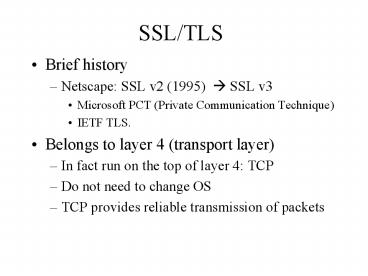SSLTLS - PowerPoint PPT Presentation
1 / 7
Title: SSLTLS
1
SSL/TLS
- Brief history
- Netscape SSL v2 (1995) ? SSL v3
- Microsoft PCT (Private Communication Technique)
- IETF TLS.
- Belongs to layer 4 (transport layer)
- In fact run on the top of layer 4 TCP
- Do not need to change OS
- TCP provides reliable transmission of packets
2
SSL position
Copied from http//developer.netscape.com/docs/man
uals/security/sslin/
3
SSL functionality
- Server authentication (by public certificate)
- Client authentication (Optional)
- Data encryption (by secret key system)
- Integrity protection by (MAC)
4
SSL handshake
I want to talk, ciphers I support, RC
Certificate (PS), cipher I choose, RS
Client
Server
SPS, keyed hask of handshake MSG
compute
compute
Kf(S,RC,RS)
keyed hash of handshake MSG
Kf(S,RC,RS)
Data protected by keys derived from K
There are total six keys, three keys (encryption
key, IV, integrity key) in each direction.
5
SSL certificate
- SSL clients such as Browser stores some CAs
public keys - User of the client can add or delete CAs public
keys - SSL servers need to get public key certificates
issued by CAs. - When SSL server sends its certificate to a SSL
client, the client can verify it. - Client certificates and authentication are not
supported widely.
6
SSL server authentication
Copied from http//developer.netscape.com/docs/man
uals/security/sslin/
7
SSL cipher suite
- DES, Triple-DES, MD5, RSA, SHA-1.
- DSA. Digital Signature Algorithm
- KEA. Key Exchange Algorithm, an algorithm used
for key exchange by the U.S. Government. - RC2 and RC4. Rivest encryption ciphers developed
for RSA Data Security. - RSA key exchange. A key-exchange algorithm for
SSL based on the RSA algorithm. - SKIPJACK. A classified symmetric-key algorithm
implemented in FORTEZZA-compliant hardware used
by the U.S. Government. (For more information,
see FORTEZZA Cipher Suites.)































